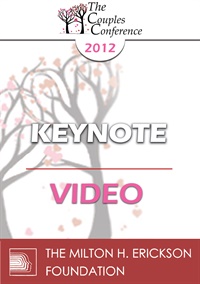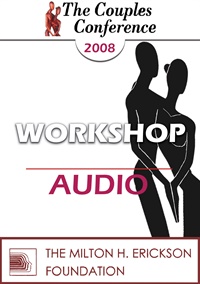
- Average Rating:
- Not yet rated
- Topic Areas:
- Workshops | Attachment | Couples Therapy | Developmental Therapy Model | Differentiation
- Categories:
- Couples Conference | Couples Conference 2008
- Faculty:
- Ellyn Bader, PhD
- Duration:
- 1:41:27
- Format:
- Audio Only
- Original Program Date:
- Apr 26, 2008
- Short Description:
- Using a developmental lens is a powerful way to lead couples to make sustained change. Learn how developmental principles can help you assess what is wrong and then guide and shape your treatment decisions. Videotapes and clinical case examples will be used throughout the workshop to demonstrate how to challenge symbiosis, facilitate differentiation and build the capacities to sustain intimacy.
- Price:
- $15.00 - Base Price
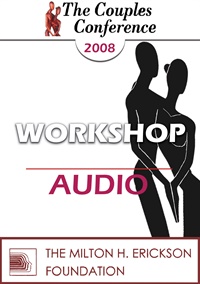
- Average Rating:
- Not yet rated
- Topic Areas:
- Workshops | Couples Therapy | Neuroscience | Intimacy | Attachment | Neurobiology
- Categories:
- Couples Conference | Couples Conference 2008
- Faculty:
- Stan Tatkin, PsyD, MFT
- Duration:
- 2:08:28
- Format:
- Audio Only
- Original Program Date:
- Apr 27, 2008
- Short Description:
- Is our brain built for love or war, connection or self-preservation? The attachment drive for a secure base involves neurological and neuro-endocrine systems and subsystems that determine such things as proximity seeking and contact maintenance. Couples most commonly enter therapy due to repeated, anticipated, and intense periods of mutual dysregulation whereby attachment injuries and adaptations become reanimated. In order to make the most of attachment theory, the psychotherapist must incorporate a working knowledge of the neurobiological processes that underlie all primary attachment relationships.
- Price:
- $15.00 - Base Price
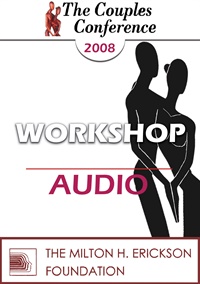
- Average Rating:
- Not yet rated
- Topic Areas:
- Workshops | Addiction | Attachment | Couples Therapy | Narcissism | Psychology | Personality Disorders | Avoidant
- Categories:
- Couples Conference | Couples Conference 2008
- Faculty:
- Stan Tatkin, PsyD, MFT
- Duration:
- 2:24:28
- Format:
- Audio Only
- Original Program Date:
- Apr 27, 2008
- Short Description:
- Comparisons have been made between severe avoidant attachment and disorders of the self such as antisocial personality, schizoid personality, and narcissistic personality. Each of these disorders, including avoidant attachment, can be grouped together as one-person psychological organizations in that they operate outside of a truly interactive dyadic system, and primarily rely upon themselves for stimulation and calming via auto-regulation. The chronic need for “alone time” can take many surprising forms throughout the lifespan, directly impacting romantic relationships.
- Price:
- $15.00 - Base Price
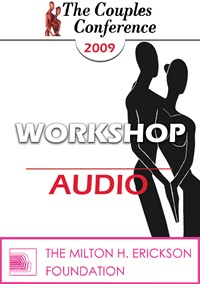
- Average Rating:
- Not yet rated
- Topic Areas:
- Workshops | Attachment | Couples Therapy | Developmental Therapy Model | Differentiation | Intimacy
- Categories:
- Couples Conference | Couples Conference 2009
- Faculty:
- Ellyn Bader, PhD
- Duration:
- 1:19:52
- Format:
- Audio Only
- Original Program Date:
- May 01, 2009
- Short Description:
- Using a developmental lens is a powerful way to lead couples to make sustained change. Learn how developmental principles can help you assess what is wrong and then guide and shape your treatment decisions. Videotapes and clinical case examples will be used throughout the workshop to demonstrate how to challenge symbiosis, facilitate differentiation and build the capacities to sustain intimacy.
- Price:
- $15.00 - Base Price
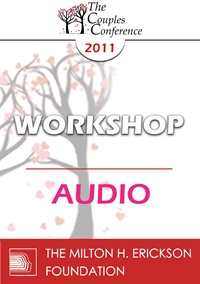
- Average Rating:
- Not yet rated
- Topic Areas:
- Attachment | Couples Therapy | Neuroscience | Workshops | Developmental Therapy Model | Differentiation
- Categories:
- Couples Conference | Couples Conference 2011
- Faculty:
- Ellyn Bader, PhD
- Duration:
- 1:12:19
- Format:
- Audio Only
- Original Program Date:
- Apr 01, 2011
- Short Description:
- Using a developmental lens is powerful to lead couples to make sustained change. Learn to use developmental principles to assess what is wrong and to direct your treatment decisions. Recognize arrested differentiation and see differentiation in action. Videotapes and clinical case examples will be used throughout the workshop to demonstrate how to promote development in hostile and conflict avoidant couples.
- Price:
- $15.00 - Base Price
- Average Rating:
- Not yet rated
- Topic Areas:
- Keynotes | Attachment | Couples Therapy | Neuroscience | Differentiation
- Categories:
- Couples Conference | Couples Conference 2012
- Faculty:
- Ellyn Bader, PhD | Peter Pearson, PhD
- Course Levels:
- Master Degree or Higher in Health-Related Field
- Duration:
- 40:20
- Format:
- Audio and Video
- Original Program Date:
- Apr 27, 2012
- Short Description:
- Drs. Ellyn Bader and Peter Pearson will start the Conference off with a Keynote on why Attachment, Differentiation and Neuroscience matter in Couples Therapy. Skillful integration of these approaches will enable you to more calmly manage couples hostility, outrageous demands and conflict/intimacy avoidance.
- Price:
-
Sale is $29.00
price reduced from Base Price - $59.00
- Average Rating:
- Not yet rated
- Topic Areas:
- Sex and Sexuality | Attachment | Couples Therapy | Keynotes | Intimacy
- Categories:
- Couples Conference | Couples Conference 2012
- Faculty:
- Esther Perel, MA, LMFT
- Course Levels:
- Master Degree or Higher in Health-Related Field
- Duration:
- 55:47
- Format:
- Audio and Video
- Original Program Date:
- Apr 28, 2012
- Short Description:
- Based on Perel’s Mating in Captivity, this bold take on intimacy and sex grapples with the obstacles and anxieties that arise when our quest for secure love conflicts with our pursuit of passion. We will tackle eroticism as a quality of aliveness and vitality in relationships extending far beyond mere sexuality and consider how the need for secure attachment and closeness can co-exist with the quest for individuality and freedom.
- Price:
-
Sale is $29.00
price reduced from Base Price - $59.00
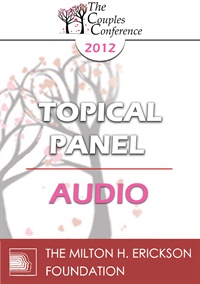
- Average Rating:
- Not yet rated
- Topic Areas:
- Attachment | Couples Therapy | Neuroscience | Topical Panels
- Categories:
- Couples Conference | Couples Conference 2012
- Faculty:
- Rick Hanson, PhD | Harville Hendrix, PhD | Stan Tatkin, PsyD, MFT | Scott R. Woolley, PhD
- Duration:
- 59:38
- Format:
- Audio Only
- Original Program Date:
- Apr 28, 2012
- Short Description:
- CC12 Topical Panel 02 - Bringing Attachment and Neuroscience into Couples Therapy: Benefits, Challenges, and Pitfalls - Rick Hanson, PhD, Harville Hendrix, PhD, Stan Tatkin, PsyD, and Scott Woolley, PhD
- Price:
- $15.00 - Base Price
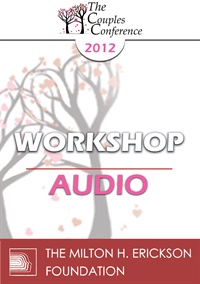
- Average Rating:
- Not yet rated
- Topic Areas:
- Attachment | Emotionally Focused Therapy (EFT) | Workshops | Couples Therapy | Relationships
- Categories:
- Couples Conference | Couples Conference 2012
- Faculty:
- Scott R. Woolley, PhD
- Duration:
- 1:53:34
- Format:
- Audio Only
- Original Program Date:
- Apr 27, 2012
- Short Description:
- Attachment injuries are a specific type of betrayal in romantic relationships that traumatize and fundamentally change basic relation-ship assumptions for injured partners and often create impasses in therapy. This workshop will present seven processes to restore love after an attachment injury and demonstrate elements of the healing process using video.
- Price:
- $15.00 - Base Price
- Average Rating:
- Not yet rated
- Topic Areas:
- Workshops | Affairs | Couples Therapy | Attachment | Attunement | Conflict | Gottman Method
- Categories:
- Couples Conference | Couples Conference 2012
- Faculty:
- John Gottman, PhD
- Course Levels:
- Master Degree or Higher in Health-Related Field
- Duration:
- 1:47:47
- Format:
- Audio and Video
- Original Program Date:
- Apr 29, 2012
- Short Description:
- The Atone-Attune-Attach model of couples’ therapy for healing from a revealed extra-relationship affair, with secrecy deception is described. Each of the three phases has 4 objectives. The roles of conflict avoidance and self-disclosure avoidance are discussed, as well as the Gottman-Rapoport conflict blueprint. To deal with attachment injuries and regrettable past incidents, the Gottman Recovery Kit is described. The Gottman-Rusbult-Glass cascade forms the basic theory for this therapy. The roles of cherishing and gratitude versus trashing and betrayal are discussed, as well as the theory of attunement and trust, and CL-ALT and betrayal.
- Price:
-
Sale is $29.00
price reduced from Base Price - $59.00
Please wait ...



